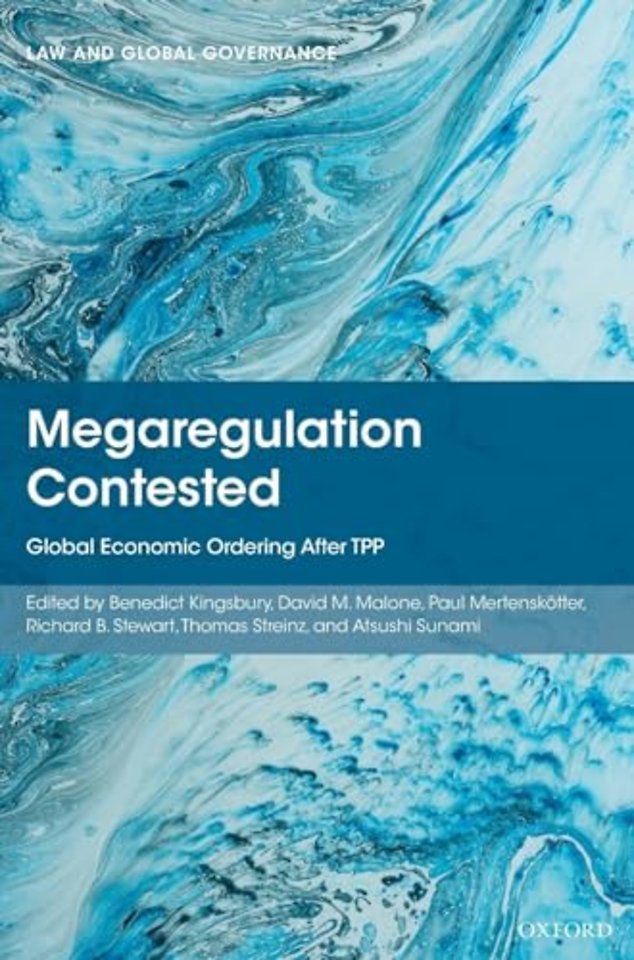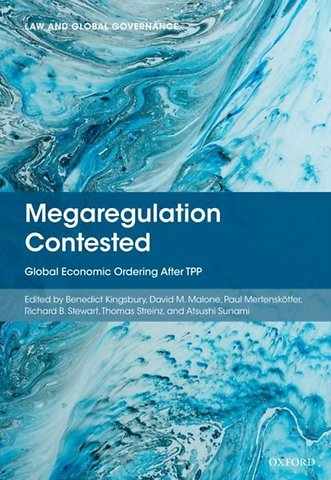


Benedict Kingsbury is Vice Dean and Murry and Ida Becker Professor of Law at New York University School of Law.
Meer over de auteursMegaregulation Contested
Global Economic Ordering After TPP
Gebonden Engels 2019 1e druk 9780198825296Samenvatting
The Japan-led Trans-Pacific Partnership (CPTPPA) of 2018 is the most far-reaching 'megaregional' economic agreement in force, with several major countries beyond its eleven negotiating countries also interested. Still bearing the stamp of the original US involvement before the Trump-era reversal, TPP is the first instance of 'megaregulation': a demanding combination of inter-state economic ordering and national regulatory governance on a highly ambitious substantive and trans-regional scale. Its text and ambition have influenced other negotiations ranging from the Japan-EU Agreement (JEEPA) and the US-Mexico-Canada Agreement (USMCA) to the projected Pan-Asian Regional Comprehensive Economic Partnership (RCEP).
This book provides an extensive analysis of TPP as a megaregulatory project for channelling and managing new pressures of globalization, and of core critical arguments made against economic megaregulation from standpoints of development, inequality, labour rights, environmental interests, corporate capture, and elite governance. Specialized chapters cover supply chains, digital economy, trade facilitation, intellectual property, currency levels, competition and state-owned enterprises, government procurement, investment, prescriptions for national regulation, and the TPP institutions. Country studies include detailed analyses of TPP-related politics and approaches in Japan, Mexico, Brazil, China, India, Indonesia, and Thailand. Contributors include leading practitioners and scholars in law, economics, and political science. At a time when the WTO and other global-scale institutions are struggling with economic nationalism and geopolitics, and bilateral and regional agreements are pressed by public disagreement and incompatibility with digital and capital and value chain flows, the megaregional ambition of TPP is increasingly important as a precedent requiring the close scrutiny this book presents.
Specificaties
Lezersrecensies
Over David Malone
Over Paul Mertenskötter
Over Richard Stewart
Over Thomas Streinz
Over Atsushi Sunami
Inhoudsopgave
Abbreviations
1: Introduction: The Essence, Significance, and Problems of the Trans-Pacific Partnership, Benedict Kingsbury, David M. Malone, Paul Mertenskötter, Richard B. Stewart, Thomas Streinz, and Atsushi Sunami
I . MEGAREGUL ATION, GEOPOLITICS, AND ORDERING PROJECTS
2: The Trans-Pacific Partnership as Megaregulation, Benedict Kingsbury, Paul Mertenskötter, Richard B. Stewart, and Thomas Streinz
3: The Uncertain Geo-Strategic Outlook for the US in Asia: The Pivot, the Re-Balance, TPP, and Now What?, David M. Malone
4: TPP and China: A Tale of Two Economic Orderings?, Jing Tao
II. CONTESTING MEGAREGUL ATION: DISTRIBUTION, INEQUALIT Y, AND DEVELOPMENT
5: The Politics of Expertise in Transnational Economic Governance: Breaking the Cycle, Annelise Riles
6: Power and Inequality in Megaregulation: The TPP Model, B. S. Chimni
7: The Lessons of TPP and the Future of Labor Chapters in Trade Agreements, Álvaro Santos
8: TPP and Environmental Regulation, Errol Meidinger
9: Customs Administration and Trade Facilitation in TPP: The Missing Development Agenda, Antonia Eliason
III. TRANSNATIONAL BUSINESS: GLOBAL VALUE CHAINS AND THE DIGITAL ECONOMY
10: In a World of Value Chains: What Space for Regulatory Coherence and Cooperation in Trade Agreements?, Bernard Hoekman and Charles F. Sabel
11: The Regulation of Firms in Globally Intertwined Markets: The Case of Payment Systems, Donald Robertson
12: TPP's Business Asymmetries: Megaregulation and the Conditions of Competition Between MNCs and SMEs, Dan Ciuriak
13: Sales, Sourcing, or Regulation? Evidence from TPP on What Drives Corporate Support for Trade, Iain Osgood
14: Digital Megaregulation Uncontested? TPP's Model for the Global Digital Economy, Thomas Streinz
IV. MEGAREGUL ATION, THE REGUL ATORY STATE, AND THE MARKET
15: Harmonization: Top Down, Bottom Up-and Now Sideways? The Impact of the IP Provisions of Megaregional Agreements on Third Party States, Rochelle Cooper Dreyfuss
16: Thailand and Public Health: Looking Beyond the Intellectual Property Chapter of TPP, Kiyoshi Adachi
17: Remote Control: TPP's Administrative Law Requirements as Megaregulation, Paul Mertenskötter and Richard B. Stewart
18: Choices and Consequences: Internationalizing Competition Policy After TPP, Daniel Francis
19: How Ready Is Indonesia to Open Government Procurement à la TPP?, Wahyuni Bahar and Joseph Wira Koesnaidi
20: Japan: Leveraging National Regulatory Reform and the Economic Modeling of Trade Agreements, Kenichi Kawasaki, Atsushi Sunami, Yoko Ikeda, and Michael C. Huang
21: Regulating Regulation: Impact Assessment and Trade, Michael Livermore and Jason Schwartz
22: Trade and Exchange Rates: The Joint Declaration of the Macroeconomic Policy Authorities of TPP Countries, Matthias Helble, Pornpinun Chantapacdepong, and Naoyuki Yoshino
V. MEGAREGULATORY TREATY INSTITUTIONS
23: The Institutions of TPP11: Back to the Future?, Robert Howse
24: State-to-State Dispute Settlement in Megaregionals, Donald McRae
25: Finding a Workable Balance Between Investor Protection and the Public Interest in the Trans-Pacific Partnership, Chin Leng Lim
VI. NATIONAL POLITICS OF MEGAREGUL ATORY AGREEMENTS
26: Japan: Interest Group Politics, Foreign Policy Linkages, and TPP, Christina L. Davis
27: Structuring Participation: Public Comments and the Dynamics of US Trade Negotiations, Robert Gulotty
28: After TPP Is Before TPP: Mexican Politics for Economic Globalization and the Lost Chance for Reflection, Alejandro Rodiles
29: Regional and Preferential Agreements: The 'Pacific' and 'Atlantic' Styles in Latin America, Rodrigo Polanco Lazo
30: Brazil in the Shadow of Megaregional Trade and Investment Standards: Beyond the Grand Debate, Pragmatic Responses, Brazil in the Shadow of Megaregional Trade and Investment Standards: Beyond the Grand Debate, Pragmatic Responses
31: TPP and India: Inspirations for Sequenced Reforms, Harsha Vardhana Singh
Index
Anderen die dit boek kochten, kochten ook
Rubrieken
- advisering
- algemeen management
- coaching en trainen
- communicatie en media
- economie
- financieel management
- inkoop en logistiek
- internet en social media
- it-management / ict
- juridisch
- leiderschap
- marketing
- mens en maatschappij
- non-profit
- ondernemen
- organisatiekunde
- personal finance
- personeelsmanagement
- persoonlijke effectiviteit
- projectmanagement
- psychologie
- reclame en verkoop
- strategisch management
- verandermanagement
- werk en loopbaan





